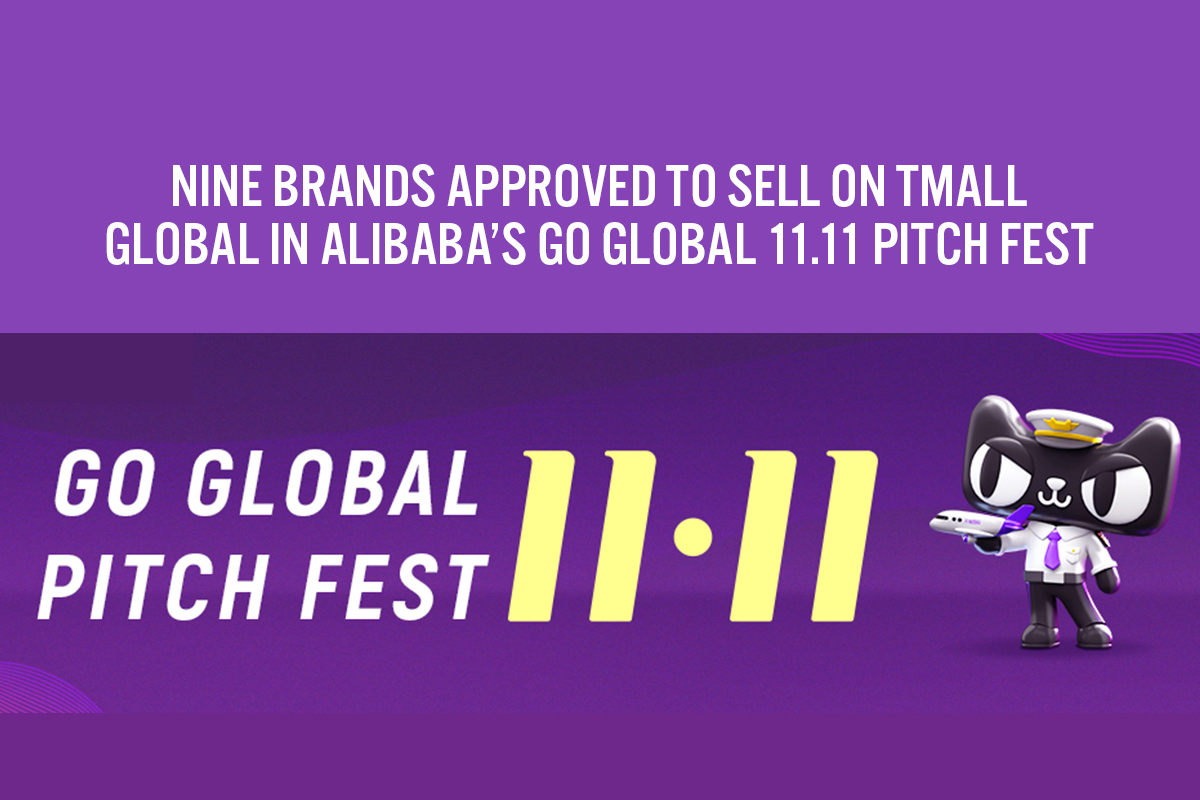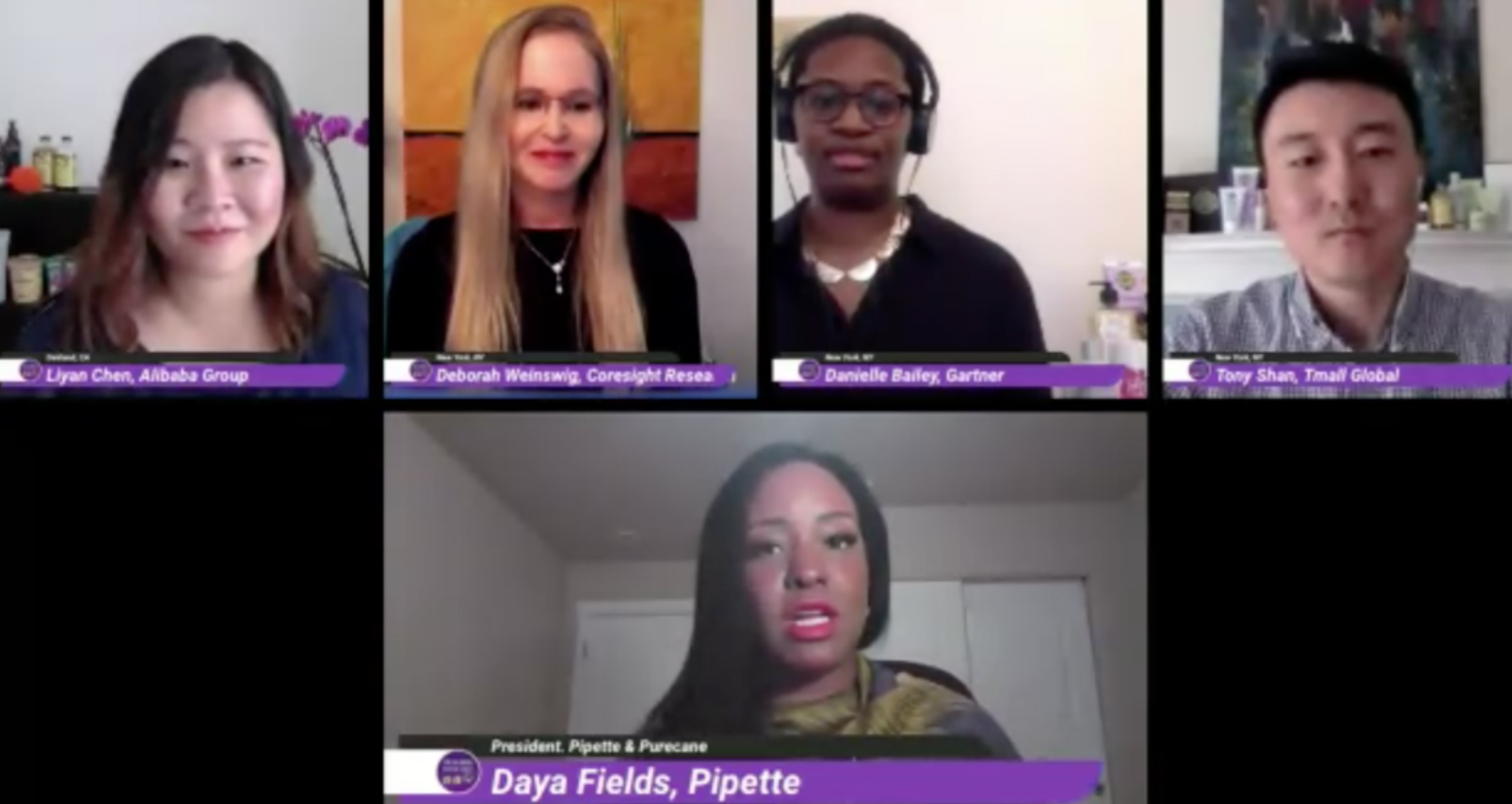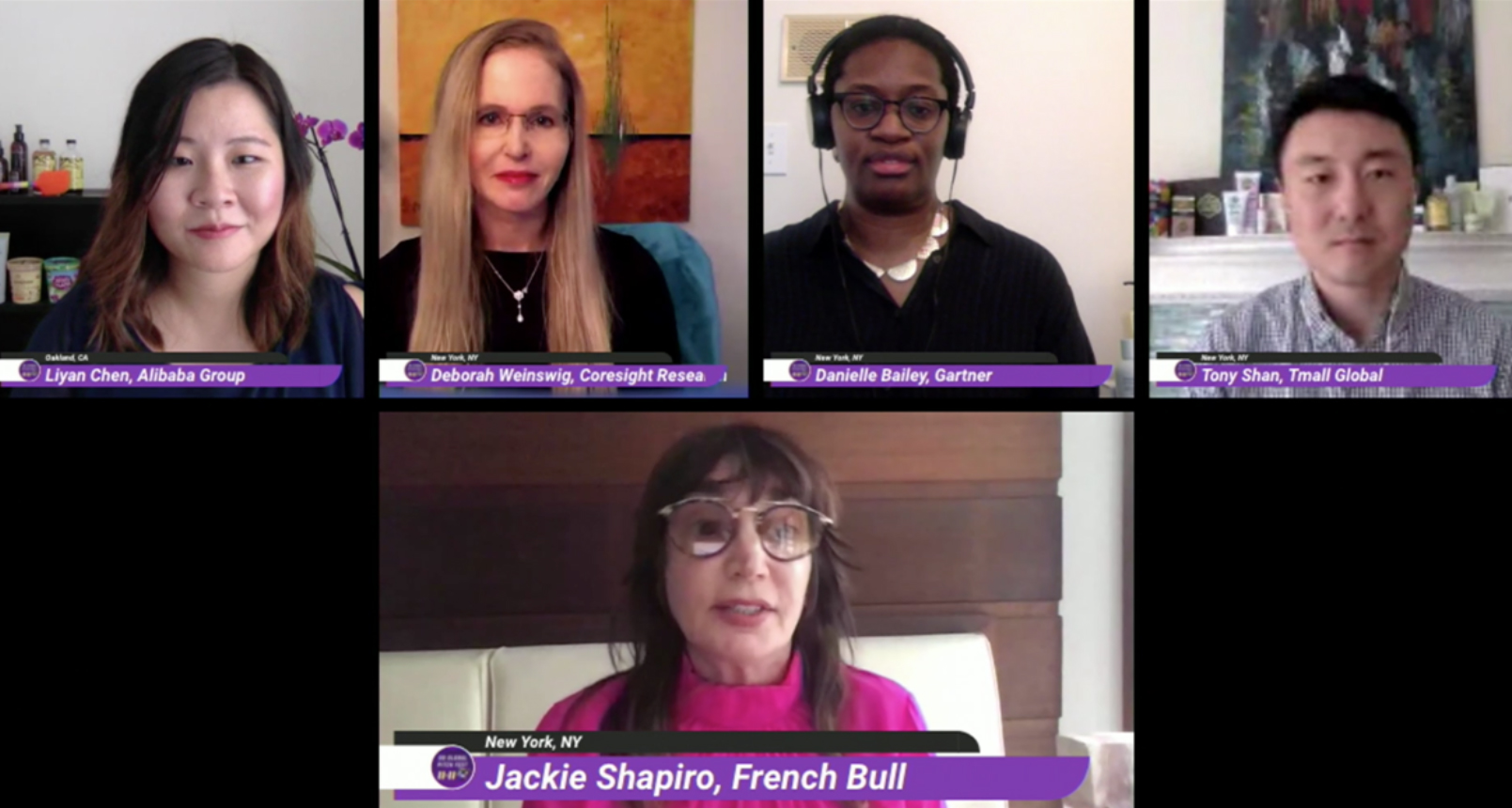
DIpil Das
On September 15, 2020, Coresight Research CEO and Founder Deborah Weinswig participated in the judging panel for Alibaba’s Go Global 11.11 Pitch Fest. The event gave US brands the opportunity to connect with Tmall Global’s US business development team for consultation and to pitch their businesses to a panel of industry experts; brands selected by the panel will be able to participate in Alibaba’s 2020 11.11 Global Shopping Festival—also known as Singles’ Day.
Weinswig was joined on the judging panel by Danielle Bailey, Managing VP at Gartner, and Tony Shan of Tmall Global. The panel heard from nine US-based small and mid-size brands. The majority of brands (five) were beauty and personal care brands, but the home and kitchen, mother and baby, and food and beverage categories were also represented.
The verdict: All judges say, “let’s go!” All nine brands were approved to sell on Singles’ Day and will now work closely with Tmall Global to coordinate a product launch in China. Below, we outline the pitches and the key differentiators of each brand.
C.O. Bigelow
C.O. Bigelow was something of an outlier in the pitch competition: While many other brands were founded just a few years ago, C.O. Bigelow has been in business for 150 years. The company’s Greenwich Village apothecary has been a staple of the neighborhood since the mid-19th century, and it is the oldest surviving apothecary in the US. The company offers skincare, makeup, bath and body, hair and fragrance products, and is expanding its online business rapidly. C.O. Bigelow owner Ian Ginsberg told the judges that he believes the heritage and guaranteed authenticity of the brand could be one of its key differentiators in the Chinese market. He also said that the company’s wide range of products, geared towards both men and women, enables it to ensure customers start and end their day with a C.O. Bigelow product, driving customer engagement and loyalty.
Pipette
Pipette was launched in September 2019 with a small array of mother-and-baby products. Since then, the company has launched 32 products, been featured in Forbes and People magazines and been crowned a top 1% traffic generator on Shopify for brands that are less than one year old. Pipette President Daya Fields credited the company’s success to its focus on sustainability and safety. The company bans the use of 2,000 potentially dangerous materials in its products, far more than the several hundred banned by US and EU regulators. All of Pipette’s products are verified by a third-party chemical research and advocacy firm and are certified by PETA (People for the Ethical Treatment of Animals) to be cruelty-free. When asked by Weinswig how Pipette would communicate their branding to the Chinese consumer, Fields indicated that the company would keep their packaging exactly the same. She told the panel that Chinese consumers crave authenticity and safety, and the non-toxic, recyclable and cruelty-free seals on the brand’s packaging provides that. Weinswig advised Pipette to stay narrow and deep in its offerings when launching in China.
[caption id="attachment_117168" align="aligncenter" width="700"] Daya Fields of Pipette pitches the company to the judging panel
Daya Fields of Pipette pitches the company to the judging panel Source: Coresight Research [/caption] Shivelight Shivelight began selling its vinegar-based beverages in 2017, but the company’s origins go back to its cherry-orchard origins in the 1970s. The company creates its organic vinegar beverages using raw pressed fruit grown by small producers in Montana. After initially launching at a farmer’s market in 2017, the company has since expanded to over 100 grocery locations across the Northwest and also sells its products on its website and on Amazon. Derrick Smith, Founder of Shivelight, told the panel that its central marketing strategy centers around its Montana origins. For many Americans, Montana is shorthand for clean water and clear skies, but Smith did acknowledge that Chinese consumers may not make the same associations with Montana; nevertheless, he told the panel that the company will be able communicate its products’ clean, fresh origins to the China market. Lab to Beauty Lab to Beauty was founded by sisters Katherine and Alison Ragusa, who wanted to bring their love for the farm-to-table movement into the beauty industry. The company makes clean beauty a priority, putting plants first in all of their products. Lab to Beauty launched initially in New York and is sold at Saks, Dublas and many luxury boutique shops. Hemp CBD is the hero ingredient in Lab to Beauty’s signature products, offering users a clear, calm complexion and to feel their best. The company also emphasizes its minimalist packaging, which Tmall Global’s Tony Shan identified as a strong selling point for Chinese consumers. Volition Volition aims to revolutionize product development in the beauty industry. Most beauty companies spend years developing products behind closed doors, often with little to no input from consumers; Volition turns this process on its head, instead taking suggestions for new products from consumers and encouraging members of its community to vote on which ones the company should produce. In the packaging of each product, the company includes a picture and short biographical profile of the customer who thought of the idea for the product. The company’s hero ingredient is the snow mushroom, which can hold more than 500 times its weight in water and naturally moisturizes and hydrates skin through Volition’s snow-mushroom serum. Bailey emphasized that the Chinese consumer values serums, and encouraged Volition to continue developing similar products. French Bull French Bull’s slogan is “Live vivid,” and the company designs everyday objects with vibrant colors and creative patterns. Jackie Shapiro, Founder of French Bull, believes that colors and patterns comprise a universal language that transcends the differences between US and Chinese consumers. The company initially offered only kitchenware products, but has since expanded into toys, pet products and home goods. French Bull sells its goods in the US through a variety of channels, from small museum gift shops to major e-commerce platforms. [caption id="attachment_117169" align="aligncenter" width="700"]
 French Bull Founder Jackie Sharp pitches her company to the judging panel
French Bull Founder Jackie Sharp pitches her company to the judging panel Source: Coresight Research [/caption] Uncle Bud’s Garret Greller, Cofounder of Uncle Bud’s, has suffered from arthritis since the age of 14 and struggled to find effective medicine that did not have harmful side effects. He helped found Uncle Bud’s two years ago to develop a solution to chronic pain for himself and countless others who suffer from similar ailments. The company now sells in over 15,000 stores across the US. Its products use CBD as the active ingredient, are made with environmentally friendly materials and are manufactured in the US. The company has already secured an endorsement from basketball player Magic Johnson, which the company believes will play well in the Chinese market. To get Chinese consumers more familiar with CBD, Uncle Bud’s also plans to provide educational materials on the benefits of CBD, as part of its promotional strategy. Punky Color Punky Color sells luxury hair-color products and invests heavily in research and development to ensure its products stay on the cutting edge. Punky Color markets its product as a “durable” hair-coloring solution, indicating that its products stay true to color even after multiple washes. The brand also offers products that easily remove hair coloring without causing any damage to the hair. The company’s main differentiators are the ease of use of its products and its comprehensive video guides on how to properly use them. Harmony Proteins Harmony Proteins was the final brand to present at Pitch Fest. Ken Ro, Head of Business Development and International Sales Manager of Harmony Proteins, touted the brand’s appealing combination of health and taste as its main differentiator. Each Harmony Proteins product is 100% plant-based, contains 10 superfood nuts and grains, and accounts for a full serving of vegetables. The company’s new superfood product, around which it plans to center its Chinese launch, contains 12 grams of almond protein in addition to the immune boosting “hero” ingredient yeast beta-glucan. Ro admitted that China was a very different market than the US but outlined two ways in which the brand is positioned well to succeed in China. First, Ro believes that all parents, no matter what continent they live on, want to persuade their children to eat vegetables while limiting their sugar intake—something Harmony Protein’s “Harmony Jr.” products are designed specifically to do. Ro sees the child and family market in China as one area where the company can succeed immediately. Secondly, Ro cited the experience that Frozen Bean, Harmony Protein’s parent company, has with expansion abroad, citing the company’s product launches, reaching from Mauritius to Maldives. The company has also already worked with Chinese gelato and ice cream shops but is only now venturing into the Chinese retail space. When asked by the judges how the company would alter its offerings for the Chinese consumer, Ro indicated that Harmony Proteins would be introducing several new regional flavors, including “tiger milk tea.” Wrap-Up All brands were approved to sell on Tmall this Singles’ Day and will now begin working closely with Tmall Global to coordinate a product launch in the Chinese market. You can follow their journey to 11.11 on alibabapowersbusiness.com. Also, be sure to read Coresight Research’s coverage of Singles’ Day on our website.